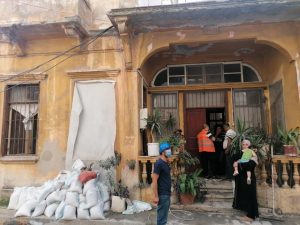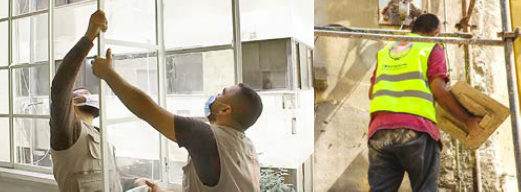Working hand in hand to answer Beirut’s call for help.
On August 4, 2020, a catastrophic explosion at the Port of Beirut shook the Lebanese capital to its core. Thanks to generous Canadian donors with ties to Lebanon including lead donor The Rossy Foundation, Myriad Canada is spending over one million US dollars to repair damaged low-income homes there as well as supporting the reconstruction of the historic St. George Hospital.
Considered one of the most powerful non-nuclear explosions in history, the blast resulted in over 200 deaths and 6,000 injuries. Damage from the explosion affected over half the city, destroying homes, schools, businesses and hospitals and leaving over 300,000 people homeless.
“It was incredible, you cannot imagine what happened,” says Lebanese engineer Nicolas Manasseh. “We have been through years of war and bombing, nothing like this. The day after the blast it was the apocalypse.”
Worldwide solidarity
The disaster could hardly have happened at a worse time. Lebanon was already reeling from an economic crisis and the devaluation of the Lebanese pound. Many citizens were cut off from their savings when banks imposed capital control, sending the poverty rate skyrocketing. The mismanagement of hazardous material behind the blast compounded a deepening disillusionment with government corruption and inaction. Layered on top of this devastation was the COVID-19 pandemic pushing the economy and healthcare system to their limits.
“When the blast came, it was already in a year where every Lebanese was already giving a lot and the solidarity that came back not only from Lebanese but also from international donors was really heart-warming because the country did not need that, we were already suffering a lot from everything that was happening,” says Zeina Farhat, director of fundraising for LIFE, a worldwide membership organisation for Lebanese professionals in the diaspora.
Lacking a strong centralised response, Lebanese citizens mobilised to clean up debris and organise relief efforts. Young volunteers cleaned up debris, repaired buildings, distributed food and helped organise medical relief. The Lebanese diaspora spread across every continent came together to respond to the call for aid. The infusion of “fresh dollars” from organisations abroad was essential in light of hyperinflation and the liquidity crisis. “We couldn’t not participate, we couldn’t lead our normal lives,” says Farhat. “Everything stopped for us on the 4th of August. Everything had to be for Beirut.”
Based in Europe, Farhat travelled to her native Beirut shortly after the blast. “It was surreal to see Beirut destroyed like that,” she says. “But we felt very lucky to at least be a part of the solution.” LIFE’s mandate focuses on strengthening professional connections and promoting the development and reform of Lebanon. Though the organisation isn’t normally involved in humanitarian work, it has felt called upon to act in the face of the catastrophic events of the past two years. Together with Lebanese diaspora organisation SEAL, LIFE raised USD 8.8 million for the Beirut Emergency Fund to cover the urgent rehabilitation of homes, SMEs and hospitals as well as medical and mental health relief.
Helping people come home
 It was a race against time to bring people back to their homes. LIFE joined hands with Myriad Canada to support the daily monitoring of the Canadian-funded reconstruction projects with the help of Manasseh, a Lebanese civil engineer who lives in Beirut. Manasseh has headed his own engineering firm for over four decades and has extensive experience both managing large-scale projects and working with international organisations. “His knowledge is priceless to us, and his values are exactly what we are trying to promote in our network: solidarity, giving back, transparency, professionalism,” says Farhat. Both Manasseh and LIFE are dedicating their time to the projects pro bono, providing crucial guidance and due diligence in a complex environment. “For me it was a great opportunity to be helpful for Lebanon and the people in need here,” Manasseh says. “It’s very gratifying, especially when you see what happened here on the ground.”
It was a race against time to bring people back to their homes. LIFE joined hands with Myriad Canada to support the daily monitoring of the Canadian-funded reconstruction projects with the help of Manasseh, a Lebanese civil engineer who lives in Beirut. Manasseh has headed his own engineering firm for over four decades and has extensive experience both managing large-scale projects and working with international organisations. “His knowledge is priceless to us, and his values are exactly what we are trying to promote in our network: solidarity, giving back, transparency, professionalism,” says Farhat. Both Manasseh and LIFE are dedicating their time to the projects pro bono, providing crucial guidance and due diligence in a complex environment. “For me it was a great opportunity to be helpful for Lebanon and the people in need here,” Manasseh says. “It’s very gratifying, especially when you see what happened here on the ground.”
To provide adequate shelter for those who cannot afford to repair their homes, Myriad Canada is working with two agile young NGOs with strong reputations for effectiveness and transparency. “The two NGOs we are supporting are led by young people, and it’s the most refreshing and rewarding environment to be in after such as catastrophe,” says Farhat. The two organisations, Beit el Baraka and Baytna Baytak, were selected with the help of LIFE and non-profit accreditation specialists 3QA. They each run professional teams of architects and contractors. “The NGOs have very little overhead compared to the larger international organisations. All the money spent is really for the people wounded and touched by the blast,” Farhat explains.
Both NGOs arose out of the pressing needs of the past few years. Beit el Baraka was founded during the 2019 economic crisis to support elderly people and others struggling with poverty with material donations, daily supplies, medicines and medical care. From the day of the blast, Beit el Baraka has been deployed in the low-income Jesuits’ Garden neighbourhood in the Geitawi area of Beirut. The damage there was extensive, ranging from dislocated windows to shattered ceilings. With the support from Canada, they are repairing 84 homes benefitting 170 needy residents, over half of them elderly. “We help the most fragile segments of society who need to feel at home when coming to us (beit) and who need a second chance at a life filled with blessings (baraka),” says founder Maya Chams Ibrahimchah.

Baytna Baytak, which means “our home is your home,” was founded to secure housing in the city for the medical professionals working at the forefront of the COVID-19 pandemic. In the wake of the blast, they expanded their mission to response efforts, relocating displaced citizens left homeless and restoring low-income homes. “What drives us is that we want to help build a Lebanon we imagine and want to live in,” says president Maroun Karam. With the Canadian funds they are refurbishing 298 damaged homes in low-income areas. “I am happy Baytna Baytak came to repair my house,” says Rene, a 76-year-old resident of Geitawi. “After the blast, my home was not suitable to live in. They repaired everything: the doors, the windows, and even the balcony ceiling that was about to collapse.”
Healthcare and hope
 Saint George Hospital University Medical Center is Beirut’s oldest hospital. Directly facing the epicentre of the blast, it was left non-operational for the first time since 1878. Already at maximum capacity due to the pandemic, it cared for those injured from the explosion even while its intensive care units were destroyed and evacuated. Four nursing staff, 12 patients and one visitor lost their lives and hundreds were injured.
Saint George Hospital University Medical Center is Beirut’s oldest hospital. Directly facing the epicentre of the blast, it was left non-operational for the first time since 1878. Already at maximum capacity due to the pandemic, it cared for those injured from the explosion even while its intensive care units were destroyed and evacuated. Four nursing staff, 12 patients and one visitor lost their lives and hundreds were injured.
The Canadian project is funding the reconstruction of the hospital’s intensive care unit (ICU) and paediatric intensive care unit (PICU), closely monitoring the building process with the intervention of LIFE and Manasseh. The painstaking preparations for this large-scale project took place against a backdrop of a strict lockdown and the overwhelming sanitary situation in Lebanon. “When you are talking to the administrative teams of the hospital, you are talking to a team that is in mayhem, real mayhem,” says Manasseh. Nevertheless, the works are currently underway and aiming for completion this summer.
Acting today for a better tomorrow
As Lebanon continues to come to grips with the impact of the destruction while battling COVID-19 and economic collapse, hope is often hard to find. “Being abroad and working for our country is very rewarding, but every day you have to find the drive,” says Farhat. “As much as our reaction to the Beirut blast really came from the heart, we are all looking for more sustainable action right now, because we really believe that Lebanon needs it.”
For those working on the ground, it is a matter of focusing on the present moment. “In Beirut we are used to living day by day,” says Manasseh. “But Lebanese people are very strong and the diaspora and KBF are very important, for our morale, for everything.” Meeting the urgent need for shelter and healthcare is an essential foundation for rebuilding the country. For Farhat it was especially moving to visit St. George, the hospital where she was born. “I’m very happy that I could do this, I was really emotional,” she says. “The trauma is not just for the people who have lived the explosion. It intersects with all of our stories.”

